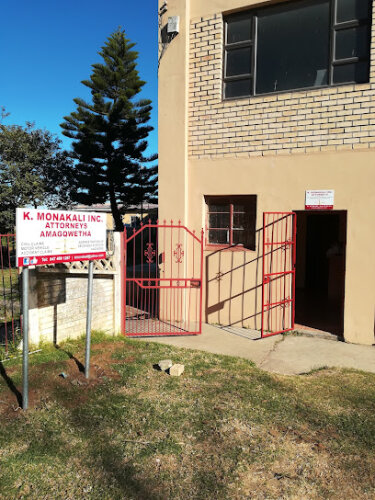Best Employment & Labor Lawyers in East London
Share your needs with us, get contacted by law firms.
Free. Takes 2 min.
List of the best lawyers in East London, South Africa
South Africa Employment & Labor Legal Articles
Browse our 1 legal article about Employment & Labor in South Africa written by expert lawyers.
- Fired Without Warning in South Africa: Wrongful Dismissal
- Most employment rights in South Africa come from the Labour Relations Act (LRA), the Basic Conditions of Employment Act (BCEA), the Employment Equity Act (EEA), and the National Minimum Wage Act. You normally have 30 days to refer an unfair dismissal dispute to the CCMA or bargaining council, and 90... Read more →
About Employment & Labor Law in East London, South Africa
Employment and labor law in East London, South Africa, governs the relationships between employers, employees, and trade unions. The city, as part of the Eastern Cape province, follows national labor legislation, providing a framework for fair work conditions, resolving workplace disputes, and protecting the rights of both workers and employers. With a diverse economy and active industrial sector, labor relations in East London encompass a broad array of industries, from manufacturing and shipping to retail and public service. The legal landscape is shaped by the Constitution of South Africa, as well as specific acts such as the Labour Relations Act, Basic Conditions of Employment Act, and the Employment Equity Act.
Why You May Need a Lawyer
Legal issues in employment can arise for both employers and employees. You may need to consult or hire a labor lawyer in the following common situations:
- Unfair dismissal or retrenchment cases
- Disputes involving wrongful termination or discrimination
- Workplace harassment, bullying, or victimization
- Non-payment of wages, overtime, or unlawful deduction of earnings
- Issues related to employment contracts or breach of contract
- Retrenchment procedures and consultations
- Trade union matters and collective bargaining
- Workplace injuries and health and safety disputes
- Equal opportunity and affirmative action compliance
- Resolving grievances through the Commission for Conciliation, Mediation and Arbitration (CCMA)
Having legal advice or representation can help you understand your rights, negotiate settlements, and represent your interests in legal proceedings or negotiations.
Local Laws Overview
East London follows the national legislation of South Africa regarding employment and labor, with some local implementation through provincial departments and agencies. Key aspects include:
- Labour Relations Act (LRA): Governs collective bargaining, dismissals, unfair labor practices, and the operation of the CCMA for dispute resolution.
- Basic Conditions of Employment Act (BCEA): Sets minimum standards for working hours, rest periods, leave (annual, sick, maternity, family responsibility), and notice periods.
- Employment Equity Act (EEA): Promotes equal opportunity and fair treatment, prohibiting unfair discrimination and requiring affirmative action measures in designated workplaces.
- Occupational Health and Safety Act (OHSA): Ensures health and safety standards in the workplace, with responsibilities for both employers and employees.
- Skills Development Act: Provides guidelines for workplace skills training and development.
Employers in East London must comply with these laws, and employees have the right to report non-compliance or seek legal intervention if their rights are violated. Disputes can often be referred to the CCMA or the Labour Court.
Frequently Asked Questions
What is considered unfair dismissal in East London, South Africa?
Unfair dismissal occurs when an employer terminates an employee's contract without a fair reason or without following a fair procedure, as outlined in the Labour Relations Act. This could include dismissals for arbitrary reasons, lack of due process, or discrimination.
What is the minimum wage in East London?
South Africa has a national minimum wage, which applies in East London. As of 2024, this is set at a predetermined hourly rate, with some variations depending on the sector. The Department of Employment and Labour can provide the most up-to-date figures.
How do I report workplace discrimination?
Workplace discrimination complaints can be addressed to your employer first. If unresolved, you may refer the matter to the Commission for Conciliation, Mediation and Arbitration (CCMA) or the Labour Court. You may also seek advice from the Department of Employment and Labour.
What steps should I take if I am not paid on time or correctly?
You should raise the issue with your employer in writing. If it is not resolved, you can lodge a complaint with the Department of Employment and Labour or refer the matter to the CCMA.
Can my employer force me to work overtime?
Employers can require overtime, but only within the legal limits set by the Basic Conditions of Employment Act, and generally with your consent. Overtime must be paid at the prescribed rate, and employees usually cannot be forced beyond these limits except under specific circumstances.
How are retrenchments handled in East London?
Retrenchments are subject to strict legal procedures. Employers must consult with employees or their representatives, provide reasons, and offer alternatives where possible. Severance pay is usually required, and disputes regarding the fairness of the retrenchment can be referred to the CCMA.
What is the role of the CCMA?
The Commission for Conciliation, Mediation and Arbitration (CCMA) resolves labor disputes through conciliation and, if necessary, arbitration. It is an accessible forum for both employers and employees in East London and across South Africa.
Do I need a lawyer to go to the CCMA?
Representation at the CCMA by a lawyer is allowed in certain cases, especially complex ones. However, individuals can represent themselves, and many cases are resolved without legal representation.
Are there protections for whistleblowers?
Yes, the Protected Disclosures Act protects employees who disclose information about unlawful or irregular conduct in the workplace, protecting them from occupational detriment or victimization.
Can I be dismissed while on sick leave?
Generally, it is unlawful to dismiss an employee solely for being on legitimate sick leave as covered by medical certificates. Dismissal procedures and fairness should always be observed, as per labor laws.
Additional Resources
If you need further information or assistance, you can turn to the following resources:
- The Department of Employment and Labour (East London regional office)
- The Commission for Conciliation, Mediation and Arbitration (CCMA)
- South African Human Rights Commission (for discrimination and equity)
- Legal Aid South Africa
- Local trade unions or worker support organisations
- Eastern Cape Chamber of Commerce and Industry (for employer advice)
- Community advice offices
These organizations offer guidance, dispute resolution services, and in some cases, free or subsidized legal advice.
Next Steps
If you need legal assistance in employment or labor matters in East London:
- Clarify your issue by documenting facts, correspondence, and any relevant contracts or payslips.
- Attempt to resolve the matter internally through your employer’s HR or management, where possible.
- Contact the Department of Employment and Labour, CCMA, or a local advice centre for guidance.
- Seek an appointment with a lawyer specializing in employment and labor law if your issue is complex, unresolved, or has led to dismissal or discrimination.
- Prepare for meetings by gathering all relevant documentation and a written summary of your situation.
Taking early and informed action will help protect your rights and improve the chances of a positive outcome. If you are unsure where to start, making use of government or community legal resources can be a helpful first step.
Lawzana helps you find the best lawyers and law firms in East London through a curated and pre-screened list of qualified legal professionals. Our platform offers rankings and detailed profiles of attorneys and law firms, allowing you to compare based on practice areas, including Employment & Labor, experience, and client feedback.
Each profile includes a description of the firm's areas of practice, client reviews, team members and partners, year of establishment, spoken languages, office locations, contact information, social media presence, and any published articles or resources. Most firms on our platform speak English and are experienced in both local and international legal matters.
Get a quote from top-rated law firms in East London, South Africa — quickly, securely, and without unnecessary hassle.
Disclaimer:
The information provided on this page is for general informational purposes only and does not constitute legal advice. While we strive to ensure the accuracy and relevance of the content, legal information may change over time, and interpretations of the law can vary. You should always consult with a qualified legal professional for advice specific to your situation.
We disclaim all liability for actions taken or not taken based on the content of this page. If you believe any information is incorrect or outdated, please contact us, and we will review and update it where appropriate.
Browse employment & labor law firms by service in East London, South Africa
East London, South Africa Attorneys in related practice areas.











